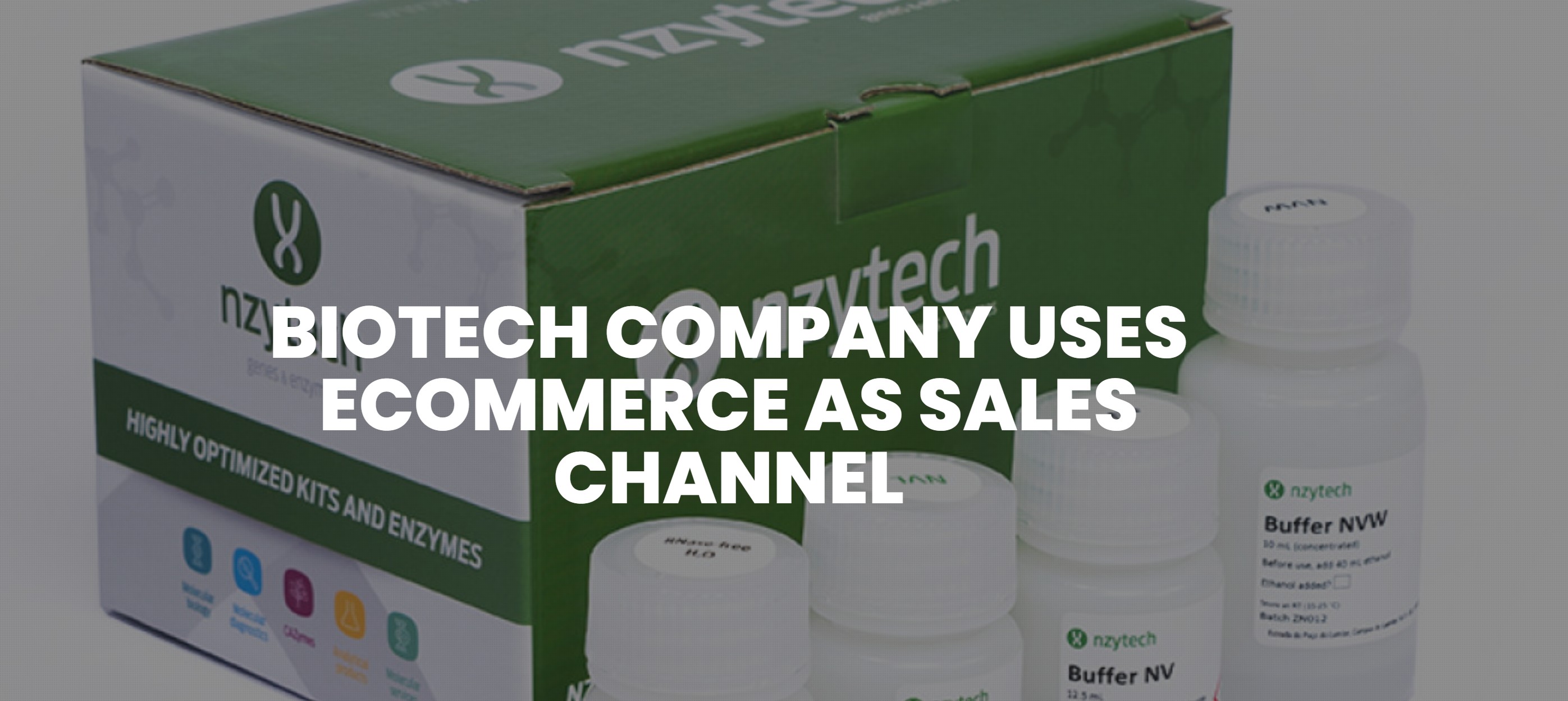7 min to read
The convergence of biotechnology and digital innovation has ushered in a new era of possibilities, revolutionizing the way we approach healthcare, agriculture, and environmental sustainability. In this dynamic landscape, companies operating in the biotech sector are presented with unprecedented opportunities for growth and advancement. By leveraging cutting-edge digital technologies, biotech firms can enhance their research and development efforts, streamline operational processes, and reach a broader audience with their products and services. In this article, we will explore seven strategies that biotech companies can adopt to accelerate their business growth in the digital age.
You could work with us, the leading digital marketing agency in Lisbon, Portugal.

Embracing Data-driven Decision-Making
One of the most powerful tools available to biotech companies in the digital age is data analytics. By harnessing vast amounts of data generated from various sources such as clinical trials, genomic sequencing, and patient records, biotech firms can gain valuable insights into disease mechanisms, drug efficacy, and market trends. Through advanced analytics techniques, such as machine learning and predictive modeling, companies can identify promising research avenues, optimize drug development processes, and personalize healthcare interventions. Additionally, data-driven decision-making enables biotech companies to allocate resources more efficiently, mitigate risks, and stay ahead of competitors in an increasingly competitive landscape.
Leveraging Artificial Intelligence and Machine Learning
Artificial intelligence (AI) and machine learning (ML) have emerged as game-changers in the biotech industry, offering unprecedented capabilities for drug discovery, diagnostics, and personalized medicine. By analyzing complex biological datasets and identifying patterns that may elude human observation, AI-powered algorithms can accelerate the pace of drug development and streamline clinical trials. Furthermore, ML models can be trained to predict patient responses to specific treatments, enabling healthcare providers to deliver more targeted and effective interventions. As AI technologies continue to evolve, biotech companies that invest in these capabilities stand to gain a significant competitive advantage in the market.
Leveraging artificial intelligence (AI) and machine learning (ML) in a biotech digital marketing strategy can significantly enhance targeting and personalization, driving more efficient and effective campaigns. Here's how AI and ML can be utilized:
-
Customer Segmentation: AI algorithms can analyze vast amounts of data to identify distinct customer segments. This helps in crafting highly targeted marketing messages that are more likely to resonate with specific groups.
-
Predictive Analytics: ML models can predict customer behaviors, such as purchasing patterns and engagement levels, allowing marketers to anticipate needs and tailor their strategies accordingly.
-
Optimization of Marketing Spend: AI can optimize budget allocation across various channels to ensure the best possible ROI. It continuously learns and adjusts the strategy based on performance data.
-
Content Personalization: ML can be used to personalize content at scale, ensuring that potential customers receive relevant information at the right stages of their journey, increasing the likelihood of conversion.
-
Chatbots and Virtual Assistants: These tools, powered by AI, can provide real-time assistance to customers, improving user experience and freeing up human resources for more complex tasks.
By integrating AI and ML into their digital marketing strategies, biotech companies can achieve more precise targeting, enhanced customer engagement, and improved conversion rates, all while optimizing marketing expenses. For a more detailed exploration of how AI and ML can revolutionize digital marketing in biotech, consider consulting with the Codedesign team, experts in advanced digital marketing solutions.
Enhancing Collaboration through Digital Platforms
Collaboration is essential for driving innovation in the biotech sector, as breakthroughs often require multidisciplinary expertise and resources. In the digital age, companies can leverage online collaboration platforms and virtual networking tools to connect with researchers, clinicians, and industry partners from around the globe. By facilitating seamless communication and knowledge sharing, these platforms enable biotech firms to form strategic alliances, access specialized expertise, and pool resources for joint research projects.
Optimizing Supply Chain Management with IoT and Blockchain
Efficient supply chain management is critical for the success of biotech companies, as it ensures the timely delivery of products and services to customers while minimizing costs and risks. In the digital age, technologies such as the Internet of Things (IoT) and blockchain offer powerful solutions for optimizing supply chain processes and enhancing transparency and traceability. IoT devices embedded in manufacturing equipment and transportation vehicles can provide real-time monitoring of inventory levels, production status, and shipment conditions.
Optimizing supply chain management with IoT (Internet of Things) and Blockchain technology offers transformative opportunities for improving transparency, efficiency, and security across various industries. Here’s how each technology contributes:
- IoT: Provides real-time data from across the supply chain through sensors and connected devices. This data helps in monitoring conditions, tracking products, and predicting maintenance needs, which enhances operational efficiency and reduces downtime.
- Blockchain: Ensures the integrity and security of data across the supply chain. It creates a decentralized and tamper-proof ledger, making it ideal for recording transactions, agreements, and product journeys transparently. This helps in reducing fraud, errors, and the cost of reconciliation.
Together, IoT and Blockchain can significantly reduce inefficiencies, improve product traceability, and increase trust among supply chain stakeholders. For businesses looking to deploy these technologies, the Codedesign team can offer expertise in integrating advanced digital solutions to optimize supply chain processes.
Implementing Digital Marketing
In today's competitive marketplace, effective marketing is essential for biotech companies to build brand awareness, attract investors, and drive customer engagement. Leveraging digital marketing strategies such as search engine optimization (SEO), social media marketing, and content marketing can help biotech firms reach their target audience more effectively and differentiate themselves from competitors. For example, partnering with a specialized agency that offers tailored content marketing for the biotech industry can help companies create compelling narratives around their products and research initiatives, thereby enhancing their visibility and credibility in the market. Implementing strategies for content marketing for biotech can further amplify the impact of their marketing efforts by delivering informative and engaging content that resonates with their audience, establishes thought leadership, and ultimately drives conversions and growth.
Implementing digital marketing for B2B e-commerce is significantly enhanced by going deeper into each strategy:
-
Content Marketing: Essential for establishing thought leadership, content marketing involves creating detailed educational materials that address complex industry issues or innovations. Whitepapers can elaborate on technology integration, case studies can demonstrate proven success with real clients, and blog posts can keep your audience updated with the latest trends and best practices.
-
SEO and SEM: Search engine optimization (SEO) should focus on high-value keywords that are specific to the B2B sector, which tends to have less search volume but higher intent. Search engine marketing (SEM) can be used to capture attention at critical moments, using targeted ads to appear at the top of search results for highly specific industry queries.
-
Email Marketing: More than just sending out newsletters, email marketing in the B2B space involves segmenting your audience based on their place in the sales funnel and tailoring messages accordingly. Automated drip campaigns can nurture leads over time, slowly building trust through a series of targeted, informative emails.
-
Social Media Marketing: While LinkedIn is a powerhouse for B2B interactions, other platforms shouldn't be overlooked. Strategies here include using targeted LinkedIn ads to reach decision-makers, participating in industry-specific discussions, and sharing content that highlights your brand's expertise.
-
Data Analytics: Leveraging data analytics in B2B digital marketing involves collecting data from all digital touchpoints and using it to refine marketing strategies. This can help identify which content types are most effective, which marketing channels yield the best ROI, and how customers interact with your online presence.
-
Personalization: At its core, personalization in B2B marketing looks to customize the user experience based on the data collected from user interactions. This could mean personalized product recommendations on a website, customized email content based on past interactions, or tailored content feeds on social media platforms.
For businesses looking to optimize their B2B e-commerce strategy, these expanded digital marketing strategies can provide a robust framework for achieving growth and engagement. Collaborating with an experienced digital marketing agency like Codedesign can ensure these strategies are expertly applied and managed.
Investing in Cybersecurity and Data Privacy
As biotech companies increasingly rely on digital technologies to store and analyze sensitive biological and patient data, cybersecurity and data privacy have become paramount concerns. A single data breach or security lapse could have devastating consequences, jeopardizing patient safety, damaging reputation, and undermining trust in the company. To mitigate these risks, biotech firms must invest in robust cybersecurity measures, such as encryption, intrusion detection systems, and employee training programs. Additionally, strict adherence to data privacy regulations, such as GDPR and HIPAA, is essential to ensure compliance and protect the rights and confidentiality of patients and research participants.
Fostering a Culture of Innovation and Agility
In the fast-paced and rapidly evolving landscape of biotechnology, companies must foster a culture of innovation and agility to stay ahead of the curve. This entails encouraging experimentation, embracing failure as a learning opportunity, and empowering employees to think creatively and adapt to change. By nurturing a culture of continuous improvement and risk-taking, biotech firms can unleash the full potential of their workforce and drive breakthrough innovations that transform the industry.

The digital age presents unprecedented opportunities for biotech companies to accelerate their business growth and drive innovation in healthcare, agriculture, and environmental sustainability. By embracing data-driven decision-making, leveraging artificial intelligence and machine learning, enhancing collaboration through digital platforms, optimizing supply chain management with IoT and blockchain, implementing digital marketing strategies, investing in cybersecurity and data privacy, and fostering a culture of innovation and agility, biotech firms can position themselves for success in the competitive marketplace.
Case study - BIOTECH COMPANY USES ECOMMERCE AS SALES CHANNEL

We wrote a Case Study on our client NZYTech – Genes & Enzymes, a leader in biotechnology, has effectively harnessed e-commerce to market PCR reagents, master mixes, and kits critical for life science research and clinical diagnostics. Transitioning from traditional B2B sales strategies, which heavily relied on in-person interactions, NZYTech embraced a digital transformation, focusing on highly specialized niches within the biotech sector.
Challenges and Strategic Overhaul
The principal challenge was to transform the conventional B2B sales framework, pivoting to an online-first approach without losing the touch of personalized service essential in biotech sales. The strategy, formulated and executed by the Codedesign team, revolved around a meticulous selection and refinement of keywords, aligning with precise product offerings and market demands.
Tactical Execution and Continuous Optimization
The initial campaigns were launched with rigorously chosen keywords following the strategic blueprint. These campaigns were continuously monitored and optimized through a bespoke dashboard developed by Codedesign, providing real-time insights into key performance metrics. This enabled ongoing adjustments and the introduction of new campaigns, ensuring alignment with evolving objectives and market dynamics.
Impactful Results
The shift to e-commerce maintained and enhanced NZYTech’s sales efficacy, with a remarkable average Return on Ad Spend (ROAS) of 650%. This not only underscored the effectiveness of targeted digital advertising but also highlighted the potential of e-commerce in the biotech sector. Furthermore, the improvement in website engagement metrics—such as increased unique visitors, reduced bounce rates, and higher pages per session—reflected the success of the comprehensive digital strategy.
Client Perspective
Miguel Alves, Marketing & Sales Director at NZYTech, commended Codedesign's professionalism and adaptability, noting their crucial role in overcoming digital challenges and achieving strategic goals. The partnership underscored the value of digital expertise in navigating the complex landscape of biotech marketing.

Add comment ×